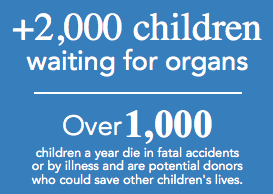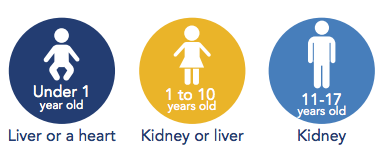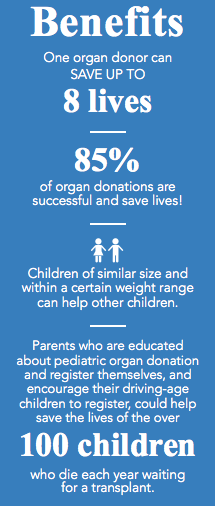Start the Conversation Now
Why Ivvvs Pediatric Organ Donation Important for Parents to Discuss?

With over 100,000 people waiting for organ transplants, little focus has been given to the children in need of organ donations. The transplant waiting list has more than 2,000 children waiting for organs, according to the federal Organ Procurement and Transplantation Network.*
We never want to think about the loss of our children; it is the hardest situation to ever imagine. But, to save other children’s lives, it is very important that parents, health-care professionals, and educators learn to have open conversations about the benefits of pediatric organ donations.
Over 1,000 children a year die in fatal accidents or by illness. These children have the potential to be organ donors and save the lives of other children. At this time, there is no national registry system in place that focuses solely on pediatric organ donation, and there is a lack of tools to help adults engage children in this sensitive topic.

The organs that children tend to need most varies by age:
- Most children under the age of 1 year are waiting for a liver or a heart.
- Most children age 1 to 10 are waiting for a kidney or liver, followed by heart.
- Most children age 11 to 17 are primarily waiting for a kidney followed by a liver.
Having conversations as a family about donating organs before a tragic event happens can help save children’s lives! Currently, most child donors are identified by organ procurement organizations asking loved ones to donate during a very difficult time of loss. These organizations are notified of potential donors by health-care professionals. Some of the challenges facing these organizations is the rate at which some hospitals identify potential donors, and that not all hospitals have staff trained to have these discussions with grieving parents. The best solution is parents making the decision to donate before tragedy strikes.

Parents Recognize Need but are Reluctant to Act Study Shows
One study shows that parents recognize that pediatric organ donation helps save the lives of other children. Yet, only a small percentage said they would like to learn more. They also stated that they would prefer to learn about organ donation from their pediatrician or from an organ donor organization.**
When families make a commitment to discuss and build a stronger awareness of
pediatric organ donation in advance of a tragedy, the likelihood of donation is greatly increased.
The number of children who need organ transplants continues to increase on average of 16 percent per year, increasing the need for donors.
Start the conversation now! No one ever expects to be in the position of an organ donor or a recipient. Discuss with your family and friends how making a commitment to organ donation can save a child’s life and help KEEP LOVE ALIVE.
Take THE PLEDGE to commit to organ donation and notify your primary care physician that you and your children have had the conversation and wish to be considered for donation. Parents can register on the national organ registry at:
https://www.donatelife.net/register/.
